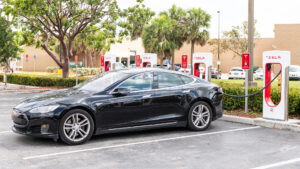House Republicans worked to eliminate clean energy tax credits in a massive tax bill that they passed in a 215-214 vote early in the morning on Thursday,. The new bill, named the “One Big Beautiful Bill Act,” would sunset individual and business incentives created by the 2022 Inflation Reduction Act, such as tax credits for electric vehicle purchases.
A large swath of the public supports such incentives. In a December 2024 survey, researchers at the Yale Program on Climate Change Communication, the publisher of Yale Climate Connections, found that 91% of liberal Democrats, 70% of moderate or conservative Democrats, 42% of liberal or moderate Republicans and 28% of conservative Republicans support tax rebates for electric vehicles. A Yale Climate Connections analysis found that red states stood to benefit the most from the law’s incentives.
In August 2024, 18 Republican members of the House asked Speaker Mike Johnson to protect the Inflation Reduction Act’s clean energy tax credits. That group was led by Rep. Andrew Garbarino, a Republican from New York.
Still, President Donald Trump campaigned on the promise to “terminate” the federal government’s efforts to reduce climate-warming pollution, and on Thursday morning, his Republican colleagues in Congress largely went along with his wishes. Roll Call reported that Garbarino did not vote on the budget reconciliation bill. Two Republicans and all Democrats voted against it.
“This policy about-face couldn’t come at a worse time: Energy prices have surged 30% since 2020,” said Ari Matusiak, CEO of the nonprofit Rewiring America, in a statement. “Maintaining these tax credits gives American households an opportunity to offset these price hikes.”
Which Inflation Reduction Act incentives would end under the House bill?
When Democrats passed the Inflation Reduction Act, they intended the clean energy tax credits to last at least 10 years, through 2032. If the House version of the bill becomes law, the following tax credits would instead largely end on December 31, 2025.

- Used clean vehicle credit and clean vehicle credit | Those who purchase a qualifying electric car are eligible for a tax credit (up to $4,000 back for a used car and $7,500 back for a new car)
- Alternative fuel vehicle refueling property credit | Individuals and businesses that install EV charging stations can get up to 30% (up to a maximum of $1,000 for individuals and $100,000 for businesses) off the cost of the project in the form of tax credits.
- Energy efficient home improvement credit | Homeowners who make qualifying purchases like energy efficient windows, home energy audits, heat pumps and more qualify for a tax credit worth 30% of the cost (up to $1,200 for energy-efficient property costs and certain energy-efficient home improvements, with limits on exterior doors ($250 per door and $500 total), exterior windows and skylights ($600) and home energy audits ($150). In addition, they can receive up to $2,000 per year for qualified heat pumps, water heaters, biomass stoves, or biomass boilers).
- The residential clean energy credit | Individuals who purchase qualifying clean energy systems like solar panels, wind turbines, geothermal heat pumps and battery storage for homes that they live in are eligible for a tax credit worth 30% of the costs.
Business clean energy incentives facing early termination
A number of incentives for businesses that invest in clean energy practices or industries will disappear if the Senate passes the budget reconciliation bill as-is. Since 2022, these incentives have boosted manufacturing and industries across the U.S.
The tax credits businesses stand to lose at the end of 2025 if the Senate passes the bill:

- Commercial clean vehicles credit | This credit gives businesses and tax-exempt organizations (like churches, universities and other nonprofits) money back for purchasing a qualified vehicle. Businesses can get $7,500 back for a small vehicle or up to $40,000 for a large vehicle like a school bus or semitruck.
- New energy-efficient home credit | Eligible contractors who build or reconstruct energy-efficient homes can get up to a $5,000 tax credit per house.
- Clean hydrogen production credit | Businesses can receive a credit for each kilogram of qualified clean hydrogen produced by a taxpayer at a qualified clean hydrogen production facility.
Other incentives, including for nuclear power production and wind and solar manufacturing, will be phased out early. Projects must begin construction within 60 days of the bill becoming law and be finished by 2028 to qualify for incentives.
The bill has climate implications beyond gutting clean energy incentives. Climate journalist Emily Atkin reported that the bill is “basically a copy-paste of a secret oil industry wish-list.” Items in the bill include ending a tax on methane pollution and speeding up approval for new fossil fuel projects.
The bill also proposes major cuts to Medicaid, thus limiting access to health care for many vulnerable people, even as climate change increases health risks from weather disasters, insect-borne diseases and extreme heat. And if passed, the bill would eliminate environmental and climate justice block grants.
As the bill moves through the Senate, it will likely change. But most public reporting suggests that Republican Senators are more interested in changes related to Medicaid and tax cuts than revising the clean energy tax credit language.
This article first appeared on Yale Climate Connections and is republished here under a Creative Commons Attribution-NonCommercial-NoDerivatives 4.0 International License. Banner photo: The U.S. Capitol at sunset (iStock image).
Sign up for The Invading Sea newsletter by visiting here. To support The Invading Sea, click here to make a donation. If you are interested in submitting an opinion piece to The Invading Sea, email Editor Nathan Crabbe at nc*****@*au.edu.



